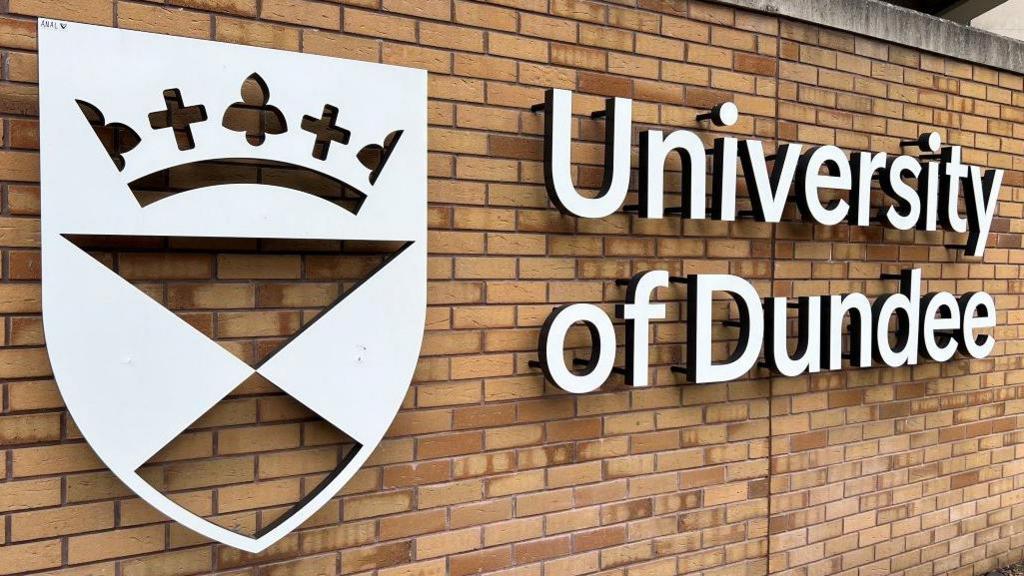I had to change my degree because of university cuts
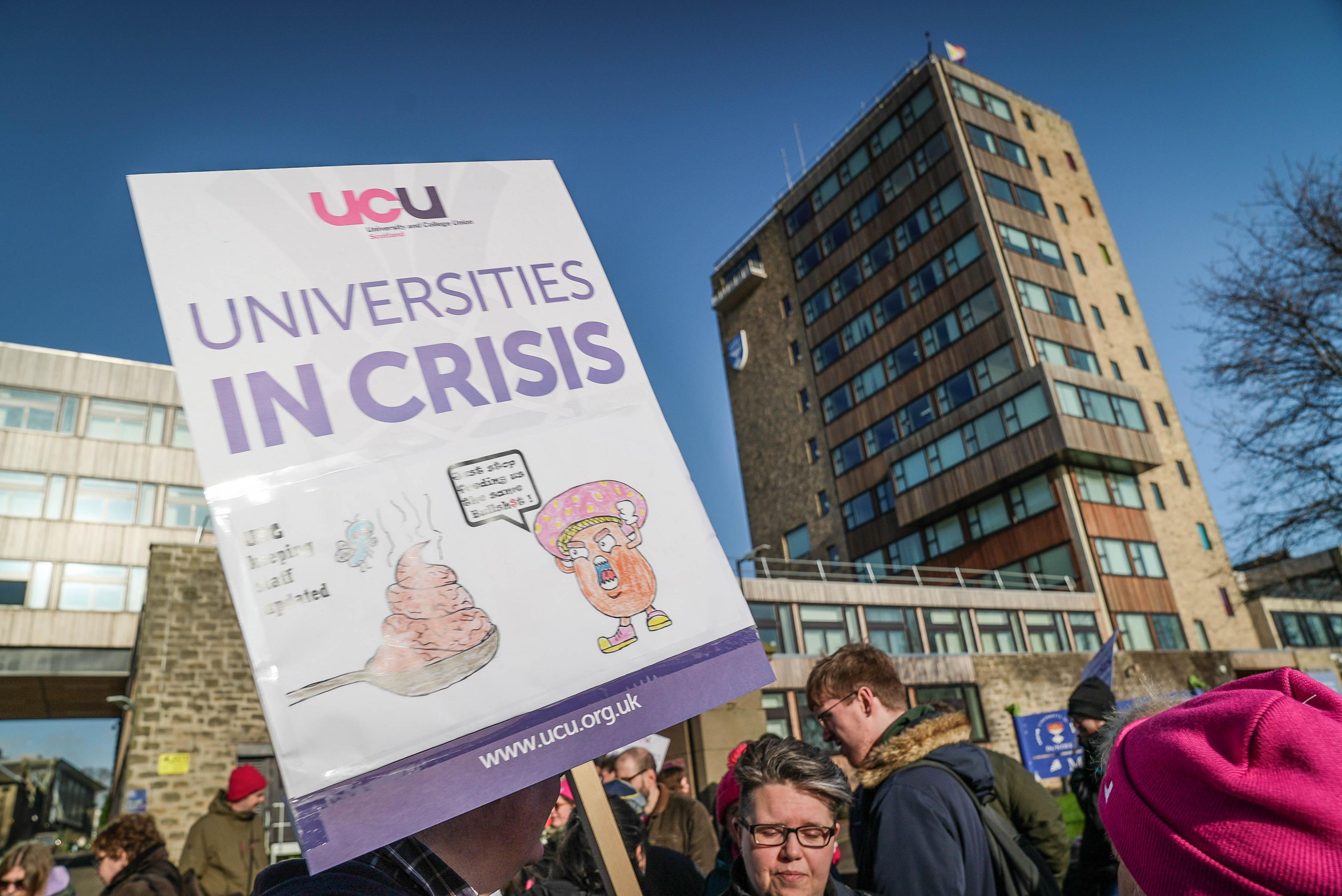
Staff have walked out for five days in an ongoing dispute over cuts
- Published
As staff at the University of Dundee walk out again over job cuts, students say they're feeling the effects across studios, classrooms and workshops.
The five-day strike is the latest chapter in a dispute between management and unions over plans to cut staff to tackle a multi-million-pound deficit.
A University of Dundee spokesperson said the measures were necessary to secure the institution's long-term financial sustainability.
While lecturers and technicians take to the picket lines, students say uncertainty, fewer modules and reduced access to facilities are taking a toll.
'Canary in the coal mine'
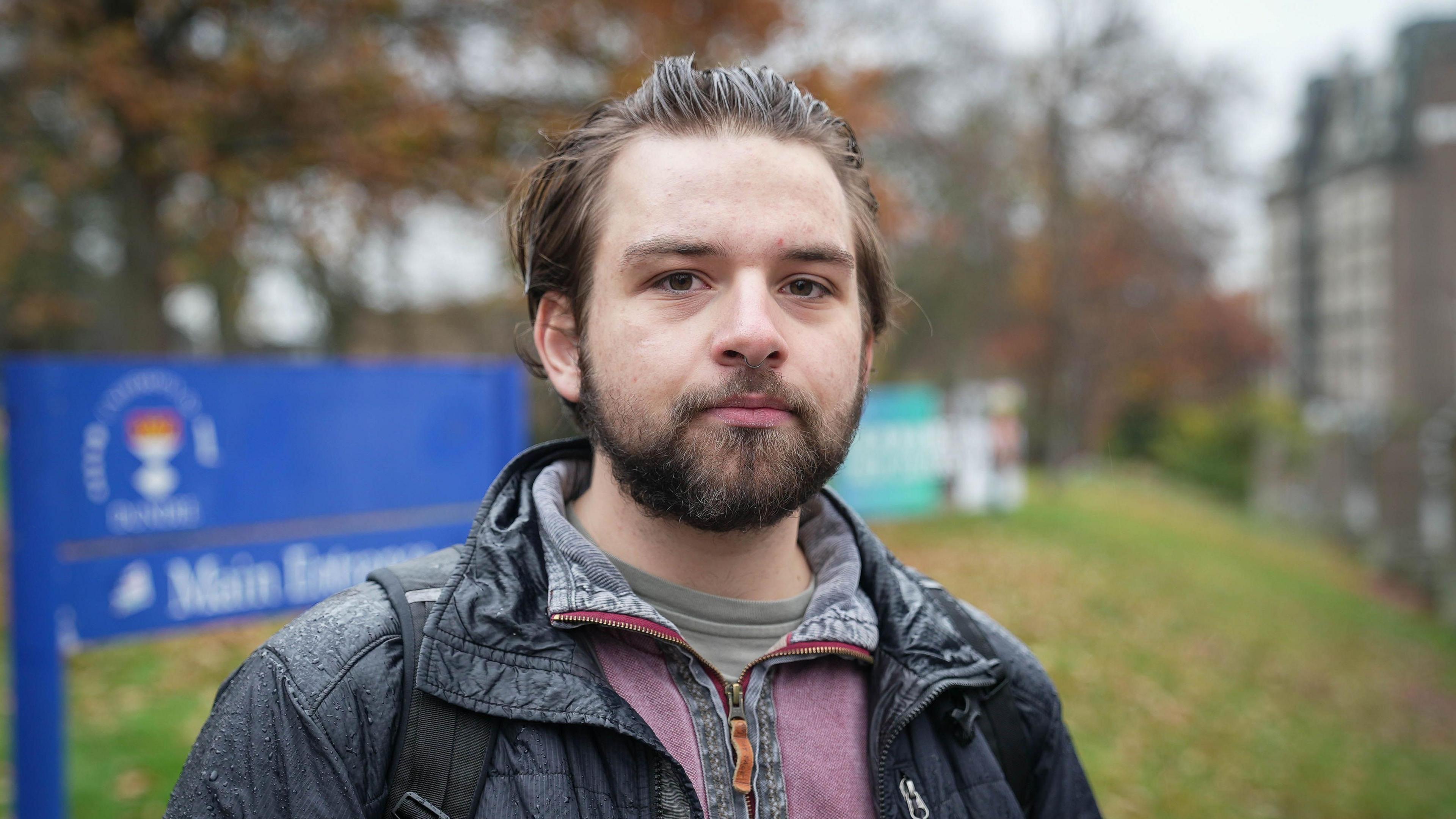
Fraser Adams says staff cuts will have a devastating impact on students' education
Fraser Adams, 21, a second-year mathematical biology student, says university cuts have already disrupted his degree.
"I was accepted to study ecological sciences, but when I got here, they told me they'd stopped running the degree," he says.
He was transferred onto a General Biological Sciences course and forced to choose a new specialism.
"I wanted to study ecology - I was passionate about it," he says. "I got here excited to do so, and I was told I couldn't."
Fraser says his experience reflects a broader pattern of reductions across the university.
"Over the past year, 20% of modules have been cut," he says.
"The degree I'm doing now used to have unique modules created specifically for it - those have all been cut too. Now my modules are just split between maths and biology, with nothing unique to my course."
He says strike action by lecturers has to be seen in the wider context of ongoing cuts.
"When you see lecturers on strike, it's easy to say that's harming students' education - they're not getting what they're paying for," he says.
"But my education has already been affected in so many ways. If we lose more lecturers, things can only get worse. People will be stretched thinner, more modules will be cut, and it'll become even more damaging.
"You've already got 370 staff positions lost and 250 unfilled," he adds. "You can see the effect of that - but the impacts of module and funding cuts are much more insidious. It's a bit of a canary in the coal mine."
Worries about accreditation

James Elliot says staff shortages and course changes have left many Dundee students worried about the future of their degrees
James Elliot, 21, a fourth-year urban planning student, said staff departures and course changes have already reduced the quality of teaching.
"We've seen some staff leave and not really be replaced, we've seen a few modules get merged," he says.
"We used to have a bigger focus on professionalism in fourth year. Now they've sort of jammed that in with a larger dissertation and cut teaching hours compared to last year.
"I know a lot of the third years have had problems with their modules and tutors because they work with architecture who's had a big problem. They're worrying about if their course will still be accredited."
Elliot adds that reduced administrative support has caused further disruption.
"I know some of the second years have had problems getting in contact with admin staff," he says.
While his own course has been "fairly lucky," he said others - especially in the humanities - have been hit harder.
"History, English and psychology students came here expecting to study their subjects properly and have found they're only doing them a third of the time," he says.
"I know some psychology students who've left for Abertay, where they get more teaching time."
A spokesperson for Dundee University said no changes had been made to the structure of these courses, which have for many years allowed students to take a wide range of subjects in first and second year before specialising in later years.
They added that retention rates in the school of humanities, social sciences and law had broadly stayed consistent, with "upticks" in some areas as a result of targeted support.
Elliot says students at Dundee's art school, DJCAD (Duncan of Jordanstone College of Art & Design), were also frustrated by the merger into a larger faculty.
"DJ CAD won't exist as a school in itself anymore," he says. "It'll be flung in with a larger faculty of arts and social sciences, I believe. Which is a horrible mistake by the uni getting rid of this really famous name at a time where they're already really publicly suffering staff losses.
"I know the ceramics workshop in there, there's a lot of students that want to do ceramics is their main thing, and then they've got here and it turns out there's no staff for that anymore.
"There's people studying architecture and they come here and they find out, No, you've not got tutors, your course might not be accredited next year."
'If I was starting now, I'd probably transfer'
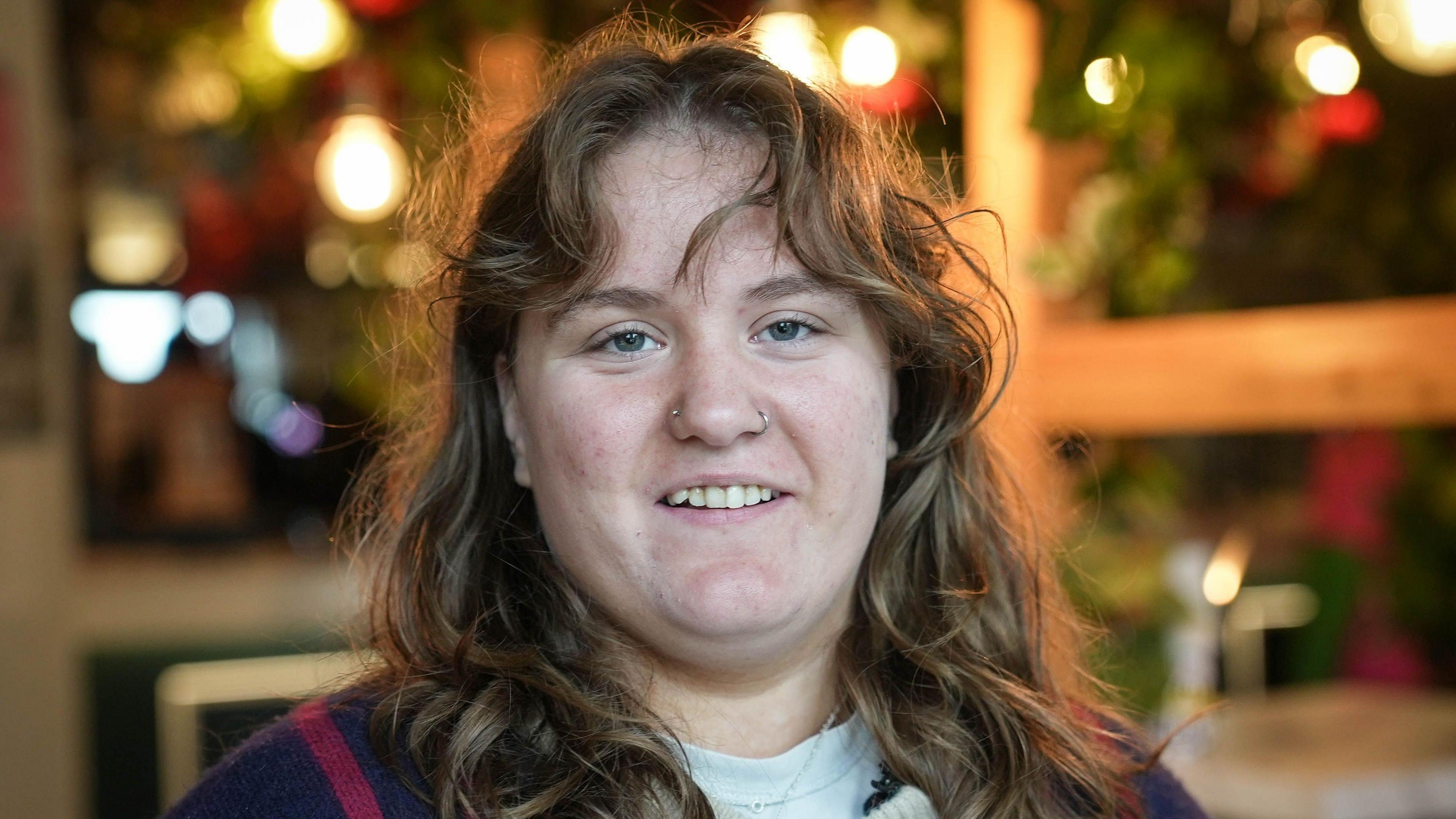
Final-year student Eva Milne said she set up The Jute Journal to help classmates stay informed amid widespread cuts and uncertainty across the University of Dundee
Eva Milne founded The Jute Journal, external newspaper to keep students informed about university decisions because she claims "students aren't told anything at all."
"You really have to dig for all the information - online, on the website, through emails... unless you have the time to sit and dig through emails, you don't know what's going on," she says.
Milne says she's seen a clear decline in the student experience during her four years at Dundee.
"From the DUSA [Dundee University Students' Association] perspective... When I was in first year, they had all these events because the uni was giving them money and freshers was really good, but over the years, you saw fewer student events just because money was dwindling and the university aren't giving DUSA any money."
She said that while she has enjoyed her experience as a student, she has seen how pressures at the university have taken their toll on the ability of staff to deliver.
"I've noticed that my lecturers are a bit stressed, our essays might be shorter because they don't have time to mark them, sometimes there is less contact time with lecturers," she adds.
Eva is about to graduate, but says she would have reservations about studying at Dundee if she was starting now.
"If I came here now in first year... I'd probably transfer to a different university," she says.
"It's not worth the risk coming here and not knowing if you'll be able to finish your course."
'Without our tutors, we can't make our art'
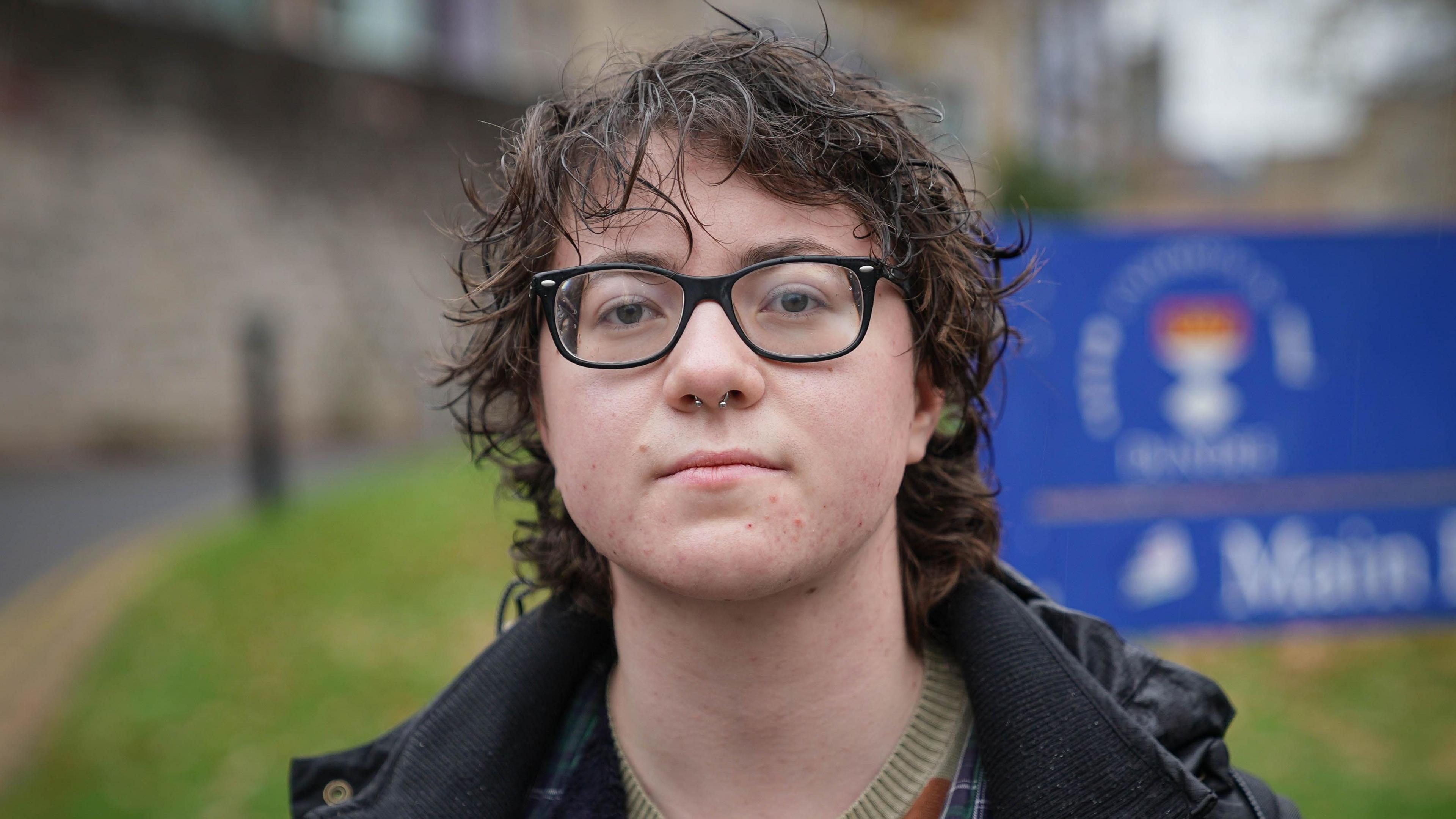
Fine art and philosophy student Michael McCarey says job losses and new fees are hitting Dundee's art school hard
Fine art and philosophy student Michael McCarey, 20, says cuts to jobs, courses and workshops at Dundee University's art school are threatening students' ability to study and create, especially in courses such as jewellery and ceramics which have been badly affected.
He says students are now being charged for facilities that used to be free.
"I know a lot of people in workshops are worried about no longer being able to have access to these things, especially because they're reintroducing the materials and consumables fees for students, something that they used to have before Covid but then stopped using," he says.
"So students will now have to pay a fee to access the studios and workshops and things that we've been able to access for free up till now."
He adds that tutors and technicians are "essential" to the art school's teaching. "Without them, we can't make our art or do the degree show - they're the ones who make the workshops run safely and help us learn new skills," he says.
He says the situation has left many students feeling anxious about their future.
"If you don't have the technicians to run the workshops, we literally can't do our art or our course," he adds. "People are wondering if their degree will even be worth the same by the time they finish."
'Students left without support'

Carlo Morelli, a senior lecturer in economics at the University of Dundee, says management is using funding meant to protect jobs to justify further cuts
Carlo Morelli, a senior lecturer in economics at Dundee University, says staff are striking because management was pressing ahead with job cuts despite millions in government support.
He says the strike aims to hold the institution to the conditions of that funding. "The university is accepting this money from the Scottish government on the basis that jobs will be kept in the city and the university is still going ahead with these job cuts.
"It's a year since the university first announced the deficit and the threat of redundancies and we've been through rounds of voluntary severance and the problem is the university still thinks staff costs are the problem," he adds.
"The Scottish government is ploughing tens of millions into this institution deliberately to keep jobs and keep the university open in a major city in Scotland and we've got a management who seem intent on using this to cut jobs and undermine the existence of the university."
Morelli adds that staff leaving had led to students being "left without lecturers and support teams".
"In some areas it's become really acute - they simply can't deliver the programmes they've committed to," he adds.
What is happening at Dundee University?
Staff at Dundee University are striking for five days in protest at plans to cut jobs as the institution continues to tackle a £35m financial deficit.
It follows three weeks of strike action in February and a ballot which saw 72% of University and College Union (UCU) Scotland members back further industrial action.
The Scottish government has already provided £40m in emergency funding to help stabilise the university, with ministers expecting this would limit job losses to about 300.
But interim principal Prof Nigel Seaton told Holyrood's education committee last week that the Scottish Funding Council had accepted that more redundancies would still be needed.
UCU Dundee co-president Melissa D'Ascenzio said the revelation of further cuts was "another shocking example" of staff learning about job losses "through parliament or the media."
Trade unions plan to hold a rally in Dundee on 13 November - a year after the deficit and job threats were first made public.
A Scottish Funding Council report earlier this year criticised the university's handling of its finances as "self-inflicted," prompting the resignation of three senior figures.
A University of Dundee spokesperson said: "Dundee UCU have notified us of the industrial action their members are taking next week.
"We will do all we can to mitigate any impacts on our students, although we do anticipate the majority of classes and student contact time will proceed as normal."
Related topics
- Published1 October
